
When you register for the ACT exam, you’ll be asked to provide much more information than just your name and address. You’ll also be asked to fill out details on your classes, grades, and extracurricular activities. ACT gathers this information for its own research. In exchange for your data, ACT will provide you with a section of your score report called “College and Career Planning.”
 This portion of your report places the strengths and activities you provide along two axes of interest—Data vs. Ideas and People vs. Things—and then compares those results to your stated major.
This portion of your report places the strengths and activities you provide along two axes of interest—Data vs. Ideas and People vs. Things—and then compares those results to your stated major.
Most counselors will tell you not to take this career planning report too seriously. Your interests in high school and college will likely change as you’re exposed to more opportunities. When reviewing the report, most students ignore this section altogether, noticing that it simply confirms what they already knew about themselves or that it doesn’t really capture the full scope of their interests.
College and Career Planning only appears on the Student Score Report [you can read more about interpreting your Student Score Report here]; an entirely different report goes to colleges when you request your scores to be sent. In fact, the supplementary information you supply takes up more than half of the ACT College Report.
To get a handle on what college admission officers see, let’s break down Ann Taylor’s sample College Report ACT provides.
The first third of the College Report displays the same scaled and detailed scores that students see on their own reports. The one difference is that US Rank is immediately followed by Institutional Rank, meaning ACT highlights your score in relation to those of the college’s most recent freshman class.
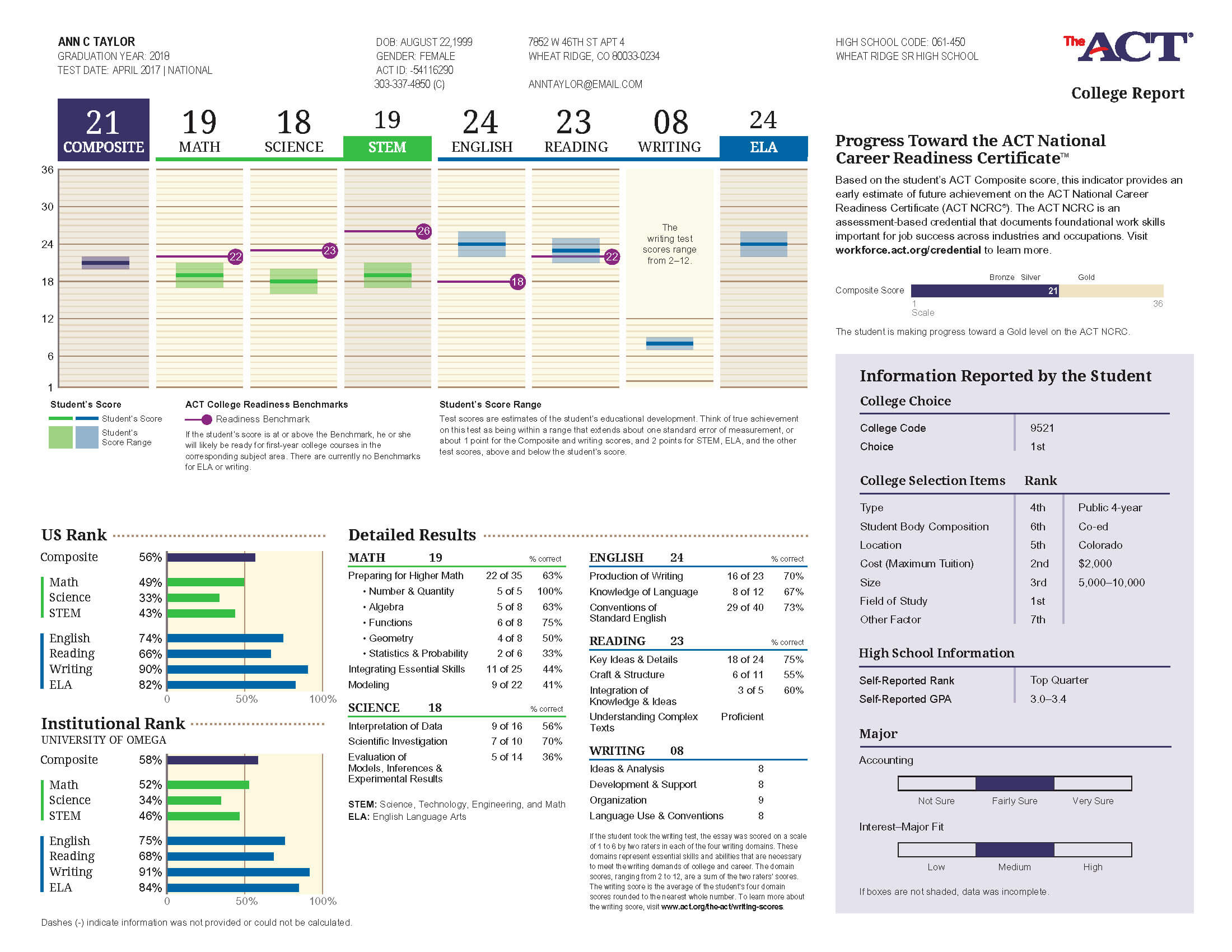 To the right of these scores, under “Information Reported by the Student,” the first thing ACT lists is “College Choice.” In the sample, University of Omega is listed as student Ann Taylor’s first choice! A University of Omega admission officer who sees this ranking might well conclude that if she offers Ann a spot in the freshman class, Ann would likely take the offer.
To the right of these scores, under “Information Reported by the Student,” the first thing ACT lists is “College Choice.” In the sample, University of Omega is listed as student Ann Taylor’s first choice! A University of Omega admission officer who sees this ranking might well conclude that if she offers Ann a spot in the freshman class, Ann would likely take the offer.
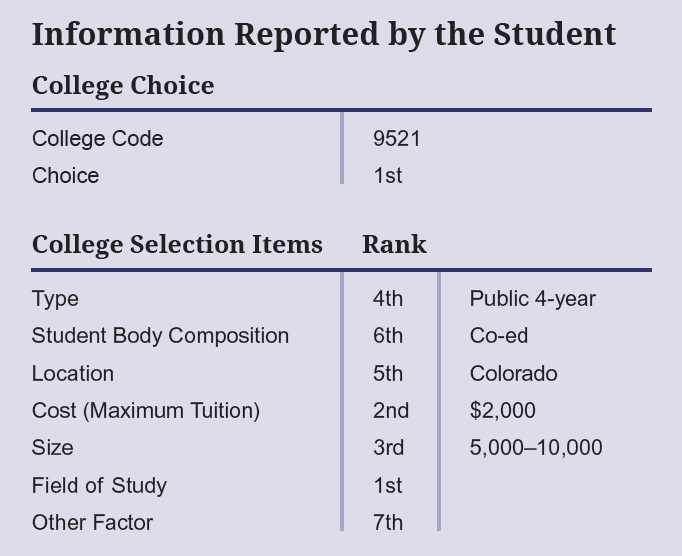
We’ve written about the concept of demonstrated interest [elsewhere on our blog], but here’s the general idea: schools are looking for ways to identify students who are really serious about accepting admission offers. Designating your top school as #1 might seem to be an effective strategy, but what message are you sending to the admission office of your fourth-choice school?
Most students don’t realize they’re demonstrating interest when they fill out the test registration and select the schools where they want their four included reports sent. Here’s an image of the registration screen:
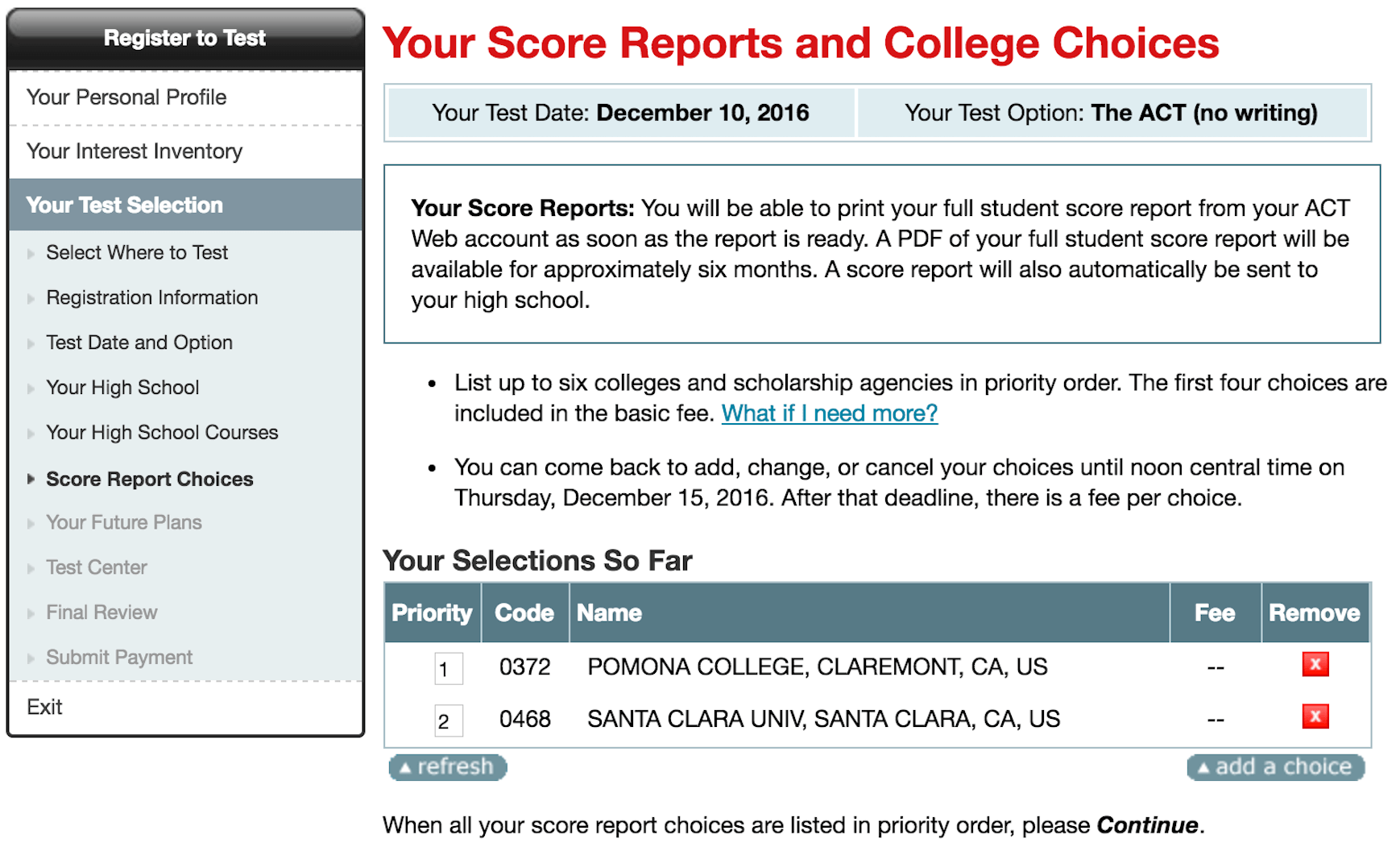 Note that when you add a score report, ACT’s registration site asks you to set the priority for each school. The level of priority gets reported as “Choice” on the report to the school.
Note that when you add a score report, ACT’s registration site asks you to set the priority for each school. The level of priority gets reported as “Choice” on the report to the school.
Similarly, you are asked to select from a series of preferences about the kind of college you may want to attend. Alongside your scores, your preferences are reported to each school. If you select a public 4-year co-ed university in California, that all-women liberal arts college in Massachusetts where you’re also applying might raise an eyebrow.
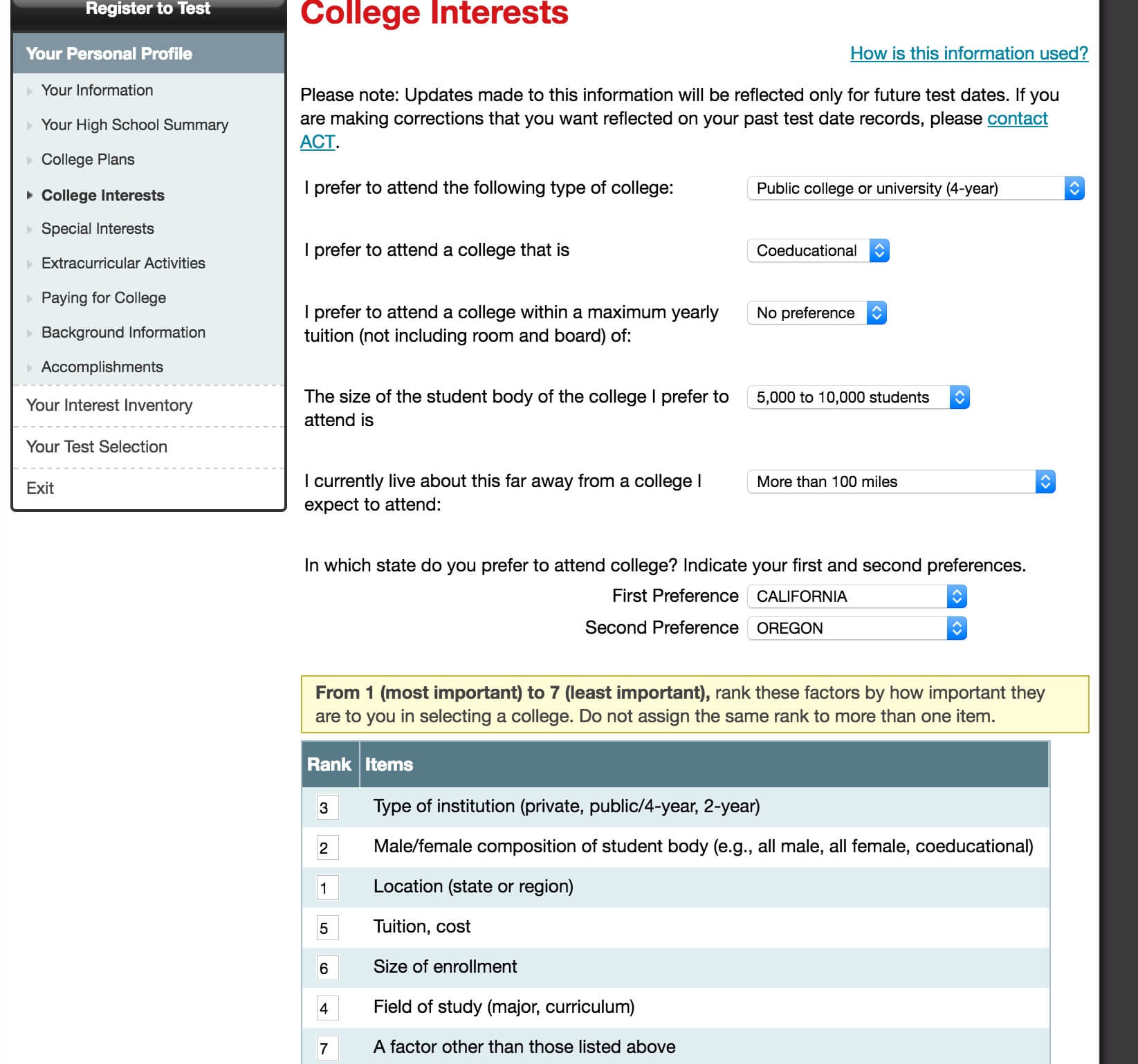
The back of the report lists more information that you’ve given ACT: high school, subjects studied, extracurricular activities, background, financial aid, enrollment and housing plans, interests, and even weaknesses. Some of these data points are more fraught then others, but all could be used by a school trying to create a well-balanced freshman class.
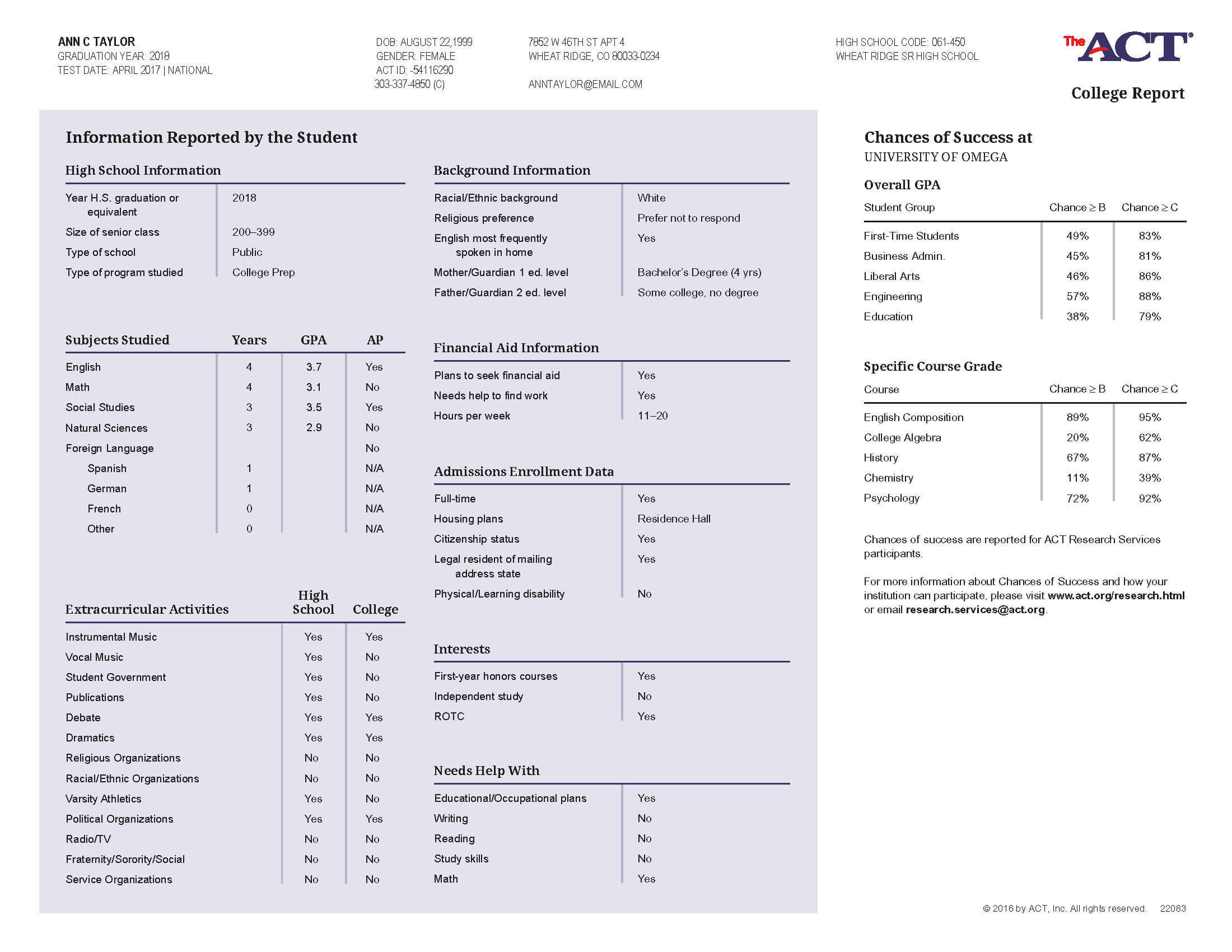 The ACT College Report concludes with a section called “Chances of Success at [University].” In order for college entrance exams to be accepted as valid, they have to be valid AT something. In the case of the ACT and SAT, they are “valid” at predicting success freshman year, even though this validity routinely undergoes controversy.
The ACT College Report concludes with a section called “Chances of Success at [University].” In order for college entrance exams to be accepted as valid, they have to be valid AT something. In the case of the ACT and SAT, they are “valid” at predicting success freshman year, even though this validity routinely undergoes controversy.
If the university to which you’re applying participates in ACT Research Services, ACT will display your chance of receiving a C or better and a B or better in a variety of classes. These chances are based on how others with your score have performed in these classes in the past. In Ann’s sample case, 49% of First-Time Students with her score range received a B or better, so the assumption is that Ann shares a 49% chance of receiving that same grade.
Colleges might use this information to estimate what additional supportive programs will be needed for an incoming class, or they might use these chances as a way to make admission decisions.
You may find that the best approach is to decline the four score reports included in your registration so that you can avoid ranking schools. Though you will incur additional charges, you will gain more control over what exactly gets sent if you wait to send until after you’ve received your scores. Similarly, you may find that leaving some preferences set to “no preference” will show greater flexibility if you’re applying to many different kinds of schools.
The sample College Report demonstrates that you might be unintentionally sharing a lot of information about yourself with schools by filling out your ACT registration. Of course, just because colleges see all of this information doesn’t necessarily mean they’ll factor it into their decisions. There’s a real chance that they simply scrape your scores into their application software and completely ignore your stated interests and profile.
In other words, it’s not worth your time and energy to worry about trying to answer each question in the way you imagine your top colleges would want, but it’s worth being aware that all of the schools where you apply will see the information you reveal.

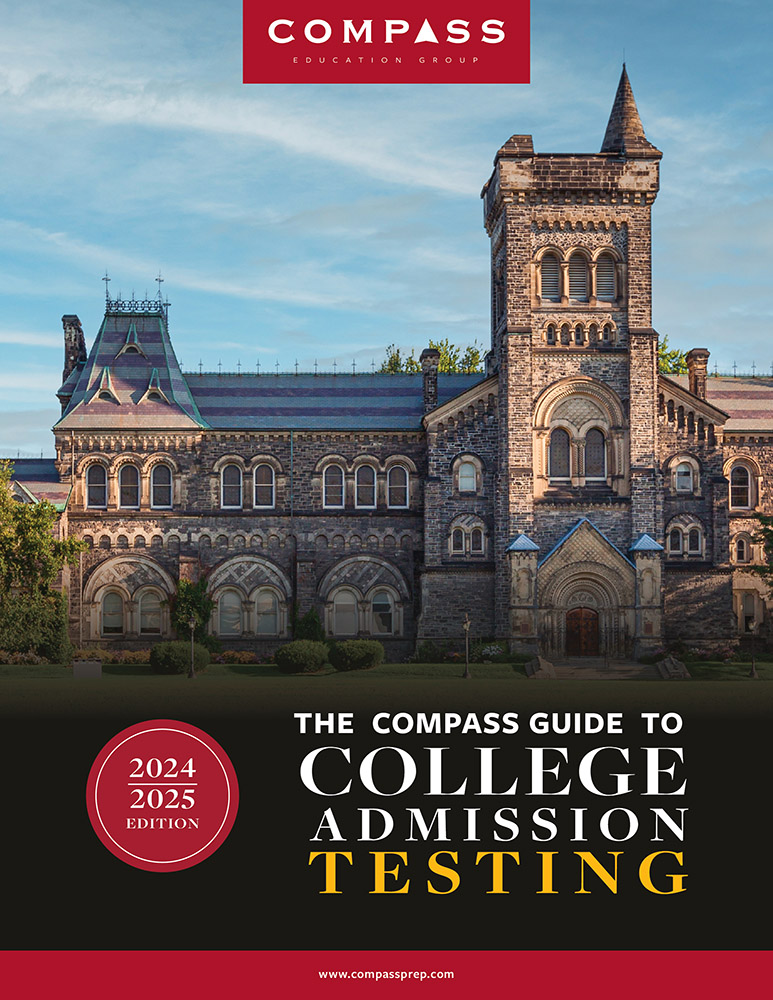
Ash, this was both interesting and markedly helpful. Thank you
Thanks, Paul! I’m glad it was useful!
Do colleges see you’re citizenship and ethnicity on your score report?
Jay,
ACT and SAT report the ethnicity data that you provide, but such information is not required for registration. College Board stopped reporting citizenship status in 2017, and I don’t believe that ACT reports it, either.
Thank you Ash! Who knew? So if you decline sending the four reports, what kind of a report does the college receive? Just the scores? Or other info as well?
Vera,
When you send an ACT report to a college, they will receive all of the detail shown. Skipping the four included reports, though, allows you to see scores before you send them and adjust any of the information in your profile.
Do colleges still see your personal info if you opt out of the Educational Opportunity Service?
Datboi,
As far as I know, colleges will still receive the information from your Student Profile Section even if you opt out of EOS. The EOS is used by colleges to identify and market to students who may or may not apply. It is similar to College Board’s Student Search Service. In short, the only way to ensure that your personal info is not passed along to colleges is to not provide it (or answer only the questions you think should be answered).
I plan to take the ACT more than once, can I change my answers to these profile questions when I take another ACT test?
Larry,
You can update your profile at any point. Keep in mind, though, that colleges will receive the information in your file at the time you send a report. It’s often best to wait for all of your testing to be complete before making final reporting decisions.
So if you choose not to use the 4 free score reports, and then you send in your scores later, will colleges be able to see what order of preference then. Ex: I use free score report and rank University X as 1 and University Y as 2. Two weeks later, I decide to pay $13 to send scores to Universities A, B, and C. Will A, B, and C be able to see that they are 3rd, 4th, and 5th, respectively??
Tyler,
ACT reports the information current at the time of reporting. Colleges generally have systems for electronically updating this information. I believe that a college only receives the rank you apply to that institution.
Hi,
If juniors are the main population taking ACT/SAT tests, how can they list 4 colleges to send their scores to? They don’t apply until fall of senior year typically.
Thanks in advance for your input.
Curious,
Many students already know some of the colleges to which they will apply. Colleges keep scores on file, so they need not be associated with a current application (in fact, a student need not apply to the school at all). We usually recommend against taking advantage of the included reports. It is a financial benefit to some families, although ACT has recently improved its access to fee waivers for additional score reports.
I am a rising senior who is happy with her ACT score. I have also not yet sent any reports to colleges. However, if I go back to the “manage your profile” page and update my information, will this updated info be reflected in the college report that I will eventually send to colleges? Or will the college score reports be constructed based on the “profile” that I created at the time that I registered for the test that I will be sending?
Chloe,
The report will be based on your profile when you actually send your report.
Since most of the information on the ACT profile is also in the Common Application or a student’s transcript, will they be penalized if they don’t fill in the ACT profile?
Belinda,
The ACT profile is voluntary. While I have not heard of any penalty by colleges, I’d recommend leaving it blank — in part or in whole — only if you have specific concerns about some of the information.
This article is incredibly helpful! What does the SAT score report look like for college?
Collin,
Most colleges get score reports electronically from College Board. It’s a bit of a bear to scroll through, but this document on file data structure gives you an idea of what colleges receive.
Does college admissions see the exact date a test is taken? For example, if a student has accommodations so they took it on another day besides national test day (or on a few days if they needed multiple sessions), is this revealed on the paperwork? A student not disclosing an LD could put down the national test day, but will their score report show they took the test on another day, a red flag? Thank you for any insight on this!
Sarah,
I have not been able to pin down the answer to this one. Since the regular test dates are noted as “National” on the score report, presumably there is a separate notation. But there are other types of administrations that are not National. Even if accommodation was mentioned — and I suspect that it isn’t — there are also many types of accommodations. Stepping back even further, I can’t imagine a) an admission officer noting the difference and b) caring. Colleges must abide by equal opportunity requirements under ADA. In short, there is little chance that it is a flag at all — red or otherwise — and I would hate to see a student take the test under sub-optimal conditions because of this concern.
Art,
If I accidentally filled out the Score Report portion of my profile and my exam already occurred, will the changes I make to my profile be reflected in the score reports colleges receive? I didn’t send any of the 4 free scores BTW.
thanks
Max,
Colleges will receive a report with your updated information.
Hello
I am a Sophmore . I just received my ACT (exam in Dec 2021)scores and i am extremely happy with them. WIll my scores be valid when i apply for colleges in 2024 or will i have to take it again
Thanks
Sam,
Your scores will still be valid. Congratulations! Carnegie Mellon is one of the few schools that discourages sophomore year scores, but it’s widely seen as a nonsensical policy.
If you opt in to EOS, do the colleges see you ACT score or score range automatically? Or do you still have to send it to the college?
B.,
EOS is a recruiting service for colleges to reach students who they might not otherwise reach. Colleges will not use the score information from EOS in admission. You do need to submit a score report or — as with more and more colleges — self-report your scores on the application.